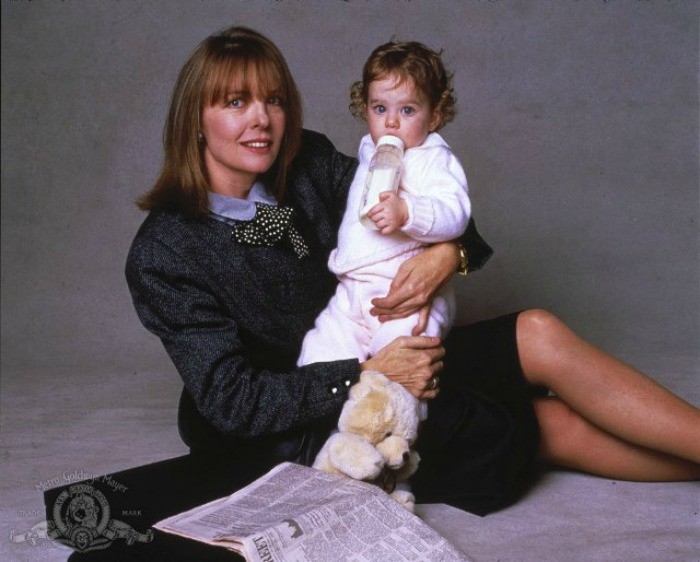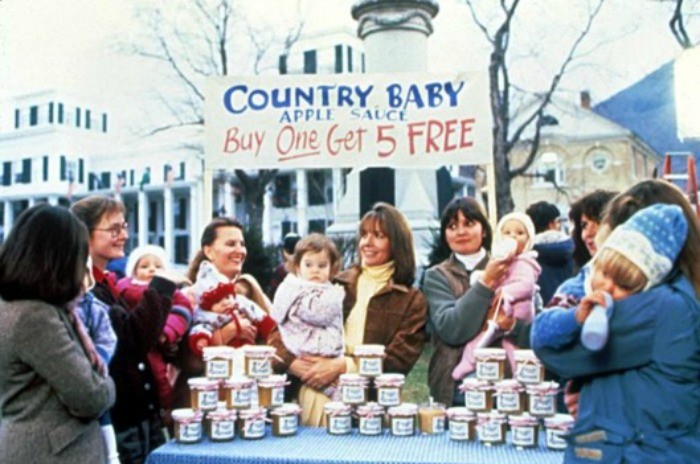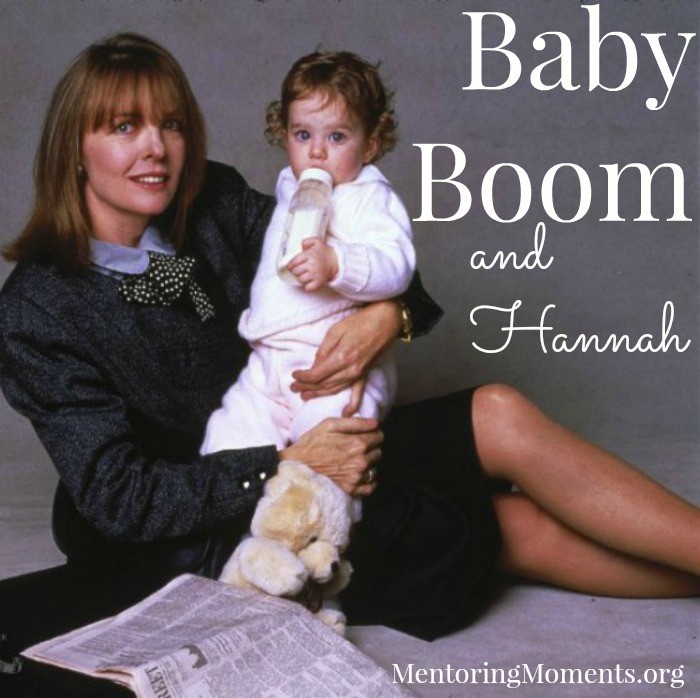In the 1987 film Baby Boom, J. C. Wiatt, played by Diane Keaton, is the consummate career woman, an executive on the fast track to a vice-presidency with a large company. She lives with her boyfriend in a spotless ultra-modern New York apartment. But her life changes radically when she receives an inheritance from a cousin in England. Imagining it to be the deed to a castle or an exotic treasure, J. C. meets the bearer of the inheritance paperwork at the airport. There she discovers that the treasure is a year-old baby girl who is dumped in J. C.’s arms. And the comedy begins.
We laugh at how inept executives are at changing diapers or feeding a baby. But it has its emotional crisis too. The boyfriend almost immediately says it’s him or the baby and—seeing that he wasn’t chosen—moves out. Then J. C. loses her job to a conniving underling because she is torn between trying to take care of the baby and spending the long hours at work she had previously.
J. C. uses her savings to buy an old farm house with an apple orchard in rural Vermont. She and the baby move there, and the house promptly goes from dream house to money pit. She needs a steady income. Noticing the baby loves the baby applesauce she makes from her orchard’s abundant crop, J. C. produces and distributes it and even expands into a line of gourmet baby foods. Her old firm suddenly wants her back. But by now she is totally in love with the baby and falling in love with the town’s veterinarian (played by Sam Shepard).
So what does Hannah of 1 Samuel chapters 1 and 2, an agrarian wife in Israel 3000 years ago, and J. C. Wiatt, a 20th century career woman, have in common? They both wanted something desperately—they wanted fulfillment. Hannah wanted it through having a child. In her society, every Jewess longed to be the mother of the coming Messiah and a barren womb was looked on as cursed by God. J. C. wanted business success. She grew up in a society where women were encouraged to devote themselves to careers. She believed what she had been taught—that climbing the corporate ladder would meet her every need.
Oddly enough, both got what they wanted after they gave up trying to get it the normal way. Hannah had to depend on the Lord to give her a child if it was His will. She had to give up her state of depression and trust that God knew what was best for her. Whether that was motherhood or a childless state. And J. C. discovered that being a fulfilled woman was more about what was in her arms than what was in the bank. Even though at first she didn’t want the baby, she rejected every other option that wasn’t as good for the baby as her own care.
As we pick up the story of Hannah in 1 Samuel 1, she doesn’t seem to be having a successful life. She lived at a very stressful time in the history of Israel, the period the book of Judges, described as “every man did what was right in his own eyes.” The socio-economic situation was a mess, and 1 Samuel 2 tells us that the religious situation wasn’t any better. Eli, the high priest, had two sons who were wicked priests, taking bribes, and even sleeping with the women who came to worship .
Hannah didn’t get cable news, so she may have not known all the troubles her country had. But she had her own troubles. She lived in the hill country near Jerusalem. She was married to Elkanah who, after realizing he wouldn’t have children through her, brought another woman into the marriage. (Something God never condoned.) In that day having children not only passed on the family line but was often your labor on the family farm and your Social Security for old age. The second wife, Peninnah, was very fertile and had many children.
Three times a year, Hannah’s life became even more difficult as she would travel with Elkanah and the whole family to the religious festivals at Shiloh. These weren’t happy trips for Hannah because, as verse 7 says, “whenever Hannah went up to the house of the Lord, her rival provoked her ‘til she wept.” As Alice Matthews put it in A Woman God Can Use: “Imagine having to walk for ten miles with someone who never stops picking at your inadequacy all the while her children keep bumping into you, wiping their noses on your skirt or asking you to carry them. No wonder Hannah arrived at Shiloh under a black cloud of depression.”
The first thing we notice about Hannah was her distress; she prayed and cried. Eli the high priest, after realizing he had misjudged her at first as being drunk, prayed that the Lord would grant her request. She had no doubt prayed before, but maybe the time had finally come. Hannah’s heart was ready to receive a child because she was ready to give him back to the Lord. She vows that if God gives her a child, she will totally dedicate him to God (1 Sam. 1:11). I wonder if she had ever promised this before; somehow I don’t think she had.
Something changed in Hannah. Whether she suddenly believed that God would answer because Eli had added his prayer to hers or she felt a sense of peace because of the vow she had made, she went away no longer depressed. Hannah conceives after they get home. And she is as good as her word, preparing Samuel (“heard of God”) from the time he is born to give him back to the Lord’s service.
To produce a Samuel, who became a great judge and prophet, God had to first prepare a Hannah. Often the preparation involves suffering. John White wrote in Daring to Draw Near, “When in her depression Hannah vowed that any child born to her would be given back to God, she little knew the consequences her vow would have. But God knew. . . . The same pain that produced a Samuel to transform Israel, produced a transformed Hannah . . . pain had driven her into the arms of God. . . . Thus it was God, not Hannah, who took the initiative. The silent cries of her desperation were the response to pressures he was placing on her.”
What kind of pressures are on you? It doesn’t matter how great the pressure is; what matters is where the pressure lies. Does it push you closer to God or farther away? The pressure of wanting a child and being barren caused Hannah to pour out her heart to God. When she did, she found that He listened intently and understood profoundly.
Have we learned, like Hannah, to pray out of barrenness? Hannah’s was only one kind, a barrenness of body. There is also a barrenness of heart—a void where love and joy should be. And a barrenness of soul when anxiety and stress crowd out peace. But, like Hannah, we can pour out our hearts and our deepest needs to God. We can ask that love and joy be replenished and peace reestablished in the midst of turmoil. We can also remind ourselves that He promised these blessings to every Christian.
Hannah’s temptation would have been to delay taking Samuel to the tabernacle. In the best tradition of Jewish mothers, she could have said:
“He’s too young yet. What does he know from tabernacles?”
“Maybe next year. He’s such a little boy. I still have to teach him table manners.”
“Probably next year. By then he’ll be 21 and really be able to help.”
But Hannah didn’t delay. She took him to Eli at a very young age—probably about three—to be raised by an old priest who had made a mess of raising his own sons. Imagine what faith in the keeping power of God that took.
Hannah learned not only to pray out of barrenness but to praise out of fullness. After she kept her vow, a song of praise to the faithfulness of God poured from her (1 Sam. 2:1-10). Her song acknowledges that whatever God gives, we owe to Him alone, and when we are obedient—even in the most difficult situations—God gives a special joy. Hannah’s obedience brought a special reward. God gave Hannah five more children, plus the special joy of knowing her firstborn was totally committed to serving God.
Hannah was, as we often are and as a C. S. Lewis book title says, Surprised by Joy.
©2016 by Vicki Huffman
*Affiliate links included.
About Vicki Huffman
National award-winning journalist Vicki Huffman's latest book is Soon to Come: The Revelation of Jesus Christ. It is a verse by verse exposition of the only purely prophetical book in the New Testament. Her other five books are: The Jesus Moses Knew: How to See Christ in the Old Testament; A Secret Hope (novel); Still Looking: Finding the Peace of God in Job Loss; Plus Living: Looking for Joy in All the Right Places, and The Best of Times. All are available in print and e-book on amazon.com. Vicki is a national award-winning author who has taught the Bible for many years. She was an editor for several Christian publishing houses, including Thomas Nelson and David C. Cook Ministries.
- Web |
- More Posts(120)









